Since I watched the movies first, I was happy to have one of my main fears dissapear completely during the first couple chapters. Many of the plot twists present on both movies are actually things the reader just knows from the start. The betrayal and the plot against House Atreides, the people behind it and the reason for it can be inferred quickly enough.
Herbert’s confidence in the world he wrote can end up being too much to a lot of people. From the beginning of the novel, characters throw around a lot of made up terms that can be confusing, and in a setting where Dukes, Counts and Emperors, Great Houses and Cults are still a thing, alongside intergalactic travel and human calculators, the politics and relationships of it all are quite complex.
The book doesn’t hold your hand at all. There are references and intriguing events from long ago that came and went and help give you an idea of the state of affairs, such as the interesting computers, for example, but a lot is left for the reader to figure out and fill the gaps as they keep reading. I think the movies helped me get through this much quicker too.
The story begins after House Atreides is put in charge of Arrakis, a planet with the most valuable substance in the galaxy, the spice melange. A drug that is essential for space travel, can improve the user’s life-span, awareness and many other things.
The planet is a huge desert, making for a harsh environment nobody would bother to live on, where water is scarce and as valued as spice. Despite this, it is inhabited by the Fremen, people who have managed to tame the desert, and resist the heavy rule of the Harkonnens, who up until then had been the House harvesting the planet’s resources for the Empire.
Our protagonist, Paul Atreides is the son of Duke Leto and Lady Jessica; and he'll finds himself entangled in the middle of prophecies, visions and politics in a path that would lead him to do what he thinks is right, but at what cost?
The novel deals with many different topics, such as the fight over natural resources, the dangers of organized religion, capitalism and freedom and things.
Some people might not like the politics at the start, others will not enjoy the spirituality later on, and a few will find everything weird and confusing and with cringy prose. I kind of loved it, I can see why this novel is among the greats, and how it has served as the inspiration of tons of different works over the decades, and it will keep on giving for years to come.
Every character has their motivations, their perspectives and interactions. There is conflict even between allies, family and friends, and it is simply so intriguing and it all feels like a big disaster and a terrible tragedy, but that is still the best possible outcome of it all.
It was a cool read, I am considering reading the next books by Frank, but we’ll see, I kind of want to read a ton of different authors, which I’ve been doing since the year begun, so maybe next year will be the year of reading full book series for a change.
Arrakis teaches the attitude of the knife - chopping off what’s incomplete and saying: “Now, it’s complete because it’s ended here.”
— from “Collected Sayings of Maud’Dib’’ by the Princess Irulan








